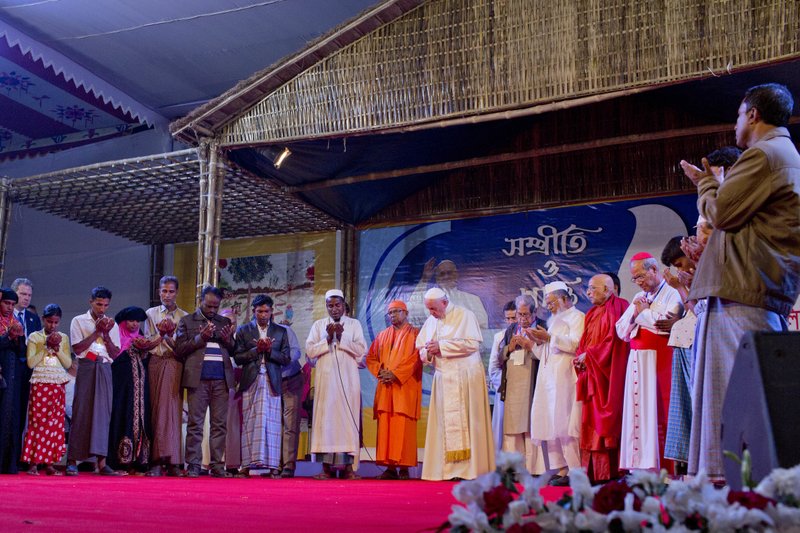DHAKA, Bangladesh (AP) — Pope Francis has gotten into trouble before for ditching diplomatic protocol and calling a spade a spade, most famously when he labeled the Ottoman-era slaughter of Armenians a “genocide” from the altar of St. Peter’s Basilica.
Francis took the hit — Turkey recalled its ambassador to the Vatican in protest — for the sake of standing up for an oppressed people who were nearly wiped off the map a century ago.
Given the opportunity to do the same in Myanmar, where the military has launched what the U.N. says is a campaign of ethnic cleansing against the Rohingya Muslim minority, Francis opted instead for diplomatic expediency. He not only avoided the contested term “Rohingya” in his public remarks, he ignored Asia’s worst refugee crisis in decades entirely and didn’t call out his hosts for launching it.
Human rights groups complained. Rohingya complained. Journalists and pundits asked if Francis’ legacy as a fearless crusader for the world’s most marginal — the poor, homeless, refugees and prisoners — wasn’t now in question.
By Friday, Francis’ heart won out.
In an emotional encounter with 16 Rohingya refugees, Francis said what he probably wanted to say from the start. His voice trembling after he greeted the men, women and children who had been forced to flee their homes in Myanmar for wretched camps in Bangladesh, Francis begged them for forgiveness for what they had endured and the “indifference of the world” to their plight.
“The presence of God today also is called ‘Rohingya,’” he told them.
And with that one word, Francis erased days of speculation that the tell-it-like-it-is, protocol-be-damned pope had sold out to the professional diplomats at the Vatican who were willing to deny a persecuted minority their very identity for the sake of global and local church politics.
The Vatican had defended Francis’ initial silence as necessary for the sake of “building bridges” with Myanmar, which only established diplomatic relations with the Holy See in May.
“Vatican diplomacy is not infallible,” spokesman Greg Burke told reporters in Yangon. “You can criticize what’s said, what’s not said. But the pope is not going to lose moral authority on this question here.”
Burke added that the Catholic Church is a minority in Myanmar. The implication was clear: Catholics are already discriminated against in predominantly Buddhist Myanmar, and certainly didn’t need any blowback from the vast majority of Burmese who recoil at the term “Rohingya” because it implies an official recognition of them as an ethnic group. The local church had urged Francis to refrain from using the term, and Francis obliged.
A pope is first and foremost a shepherd to his flock.
The Vatican also wanted to back its local church in supporting Aung San Suu Kyi, who many Burmese see as their only hope for forging a more democratic, inclusive society where basic rights are guaranteed for all minorities — Christians included.
And so when he arrived in Yangon and joined Suu Kyi at an official welcome ceremony, Francis behaved like a true diplomat.
He called for all ethnic groups in Myanmar to have their basic rights guaranteed — an important message to be sure but one that was clearly written by committee.
Francis upped the ante when he arrived in Bangladesh, where he acknowledged the “immense toll of human suffering” under way in the squalid, overcrowded refugee camps that are now home to more than 620,000 Rohingya who have poured across the border from Myanmar’s Rakhine state.
In his official arrival speech, Francis demanded the international community take “decisive measures” to not only help Bangladesh provide for the refugees, but to resolve the underlying political causes in Myanmar that set off the exodus.
But he didn’t say “Rohingya.” Until he met them.
And when he did, when he clasped their hands in his and listened to their tragedies, he not only acknowledged their identity, he assumed responsibility for all the suffering they had endured.
“In the name of all those who persecute you, who have persecuted you, and those who have hurt you, above all in the indifference of the world, I ask you for forgiveness,” he said. He repeated the word: “Forgiveness.”
Francis was back.
AP

